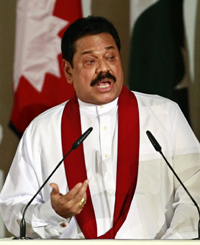New York, November 10, 2011–The Committee to Protect Journalists is concerned by the Sri Lankan government’s announcement of an upcoming set of guidelines and code of conduct for journalists and media organizations, and believes these regulations will only increase the government’s control of the media.
The announcement, which appeared Thursday in the government-owned Daily News, said the government would “soon introduce a set of guidelines and a code of conduct for media to be adhered to by all media institutions and media persons in the country.” The announcement also stated that the government would set up the guidelines, which would be enforced under the relevant laws.
The announcement followed an official statement from the Media Ministry on Saturday requesting “the relevant websites to communicate with the Ministry and register their accreditation,” but did not specify the type of accreditation needed. Since the announcement appeared, access to at least five websites critical of the government has been blocked to users inside the country.
“Website registration rules, the blocking of websites, and now talk of media guidelines are indicators that the pressure on voices critical of President Mahinda Rajapaksa’s government is only going to increase,” said Bob Dietz, CPJ’s Asia program coordinator. “Calls for reform have fallen on deaf ears inside the government in the past. Colombo’s diplomatic community must work to engage with the president to reverse these policies.”
The announcement quoted Media Ministry Secretary W.B. Ganegala as saying, “We are not going to implement guidelines which cannot be accepted. A public dialogue needs to be created in order for guidelines to evolve and a code of conduct acceptable to all media institutions.”
In a 2010 special report, In Sri Lanka, no peace dividend for press, CPJ found that the end of Sri Lanka’s war with Tamil rebels had not eased the repression of independent media. Since then, CPJ has documented a steady stream of harassment and attacks on what remains of the country’s traditional independent press, and reports that in recent months the government has turned its attention to online media and other digital platforms.
